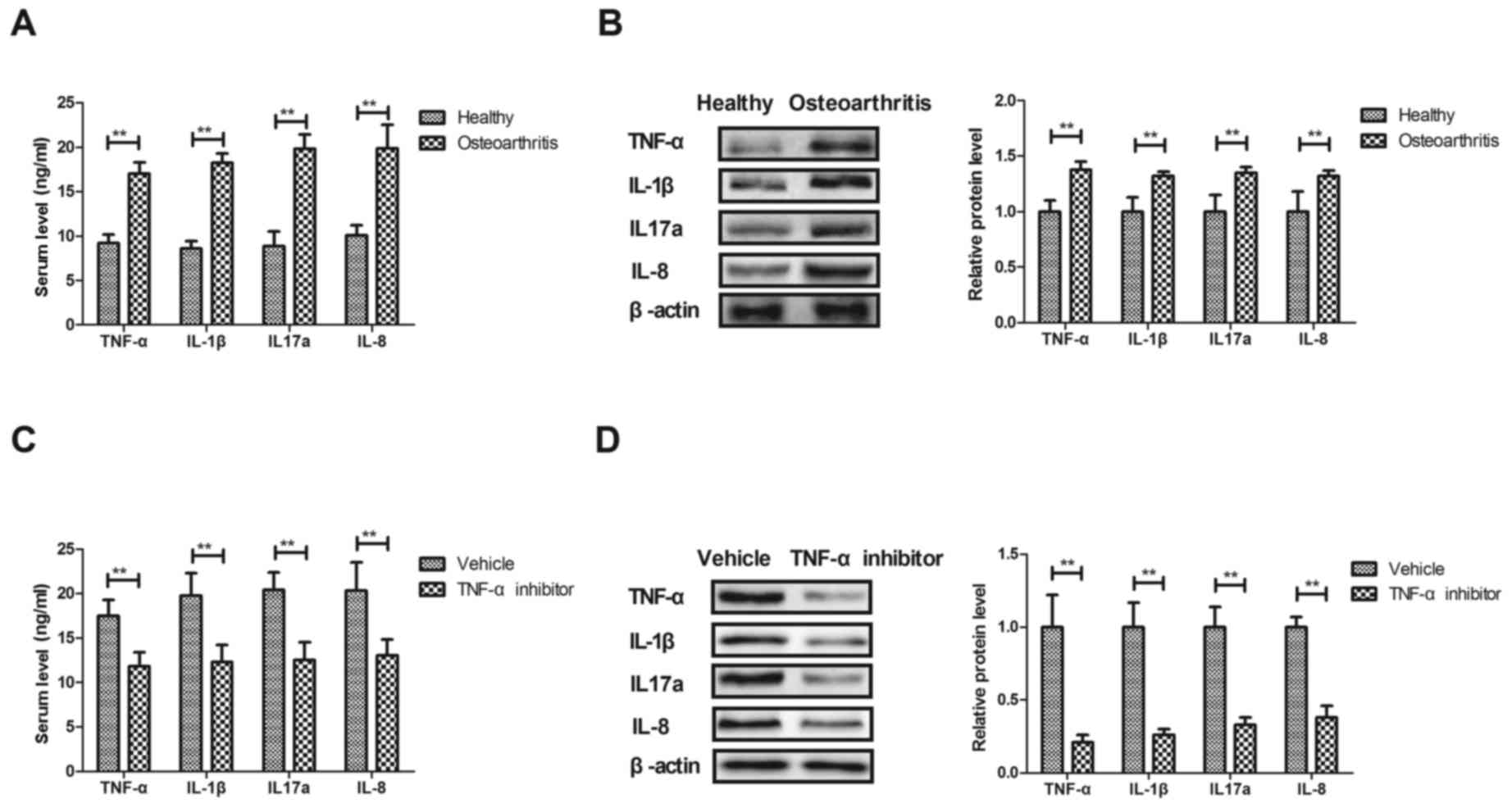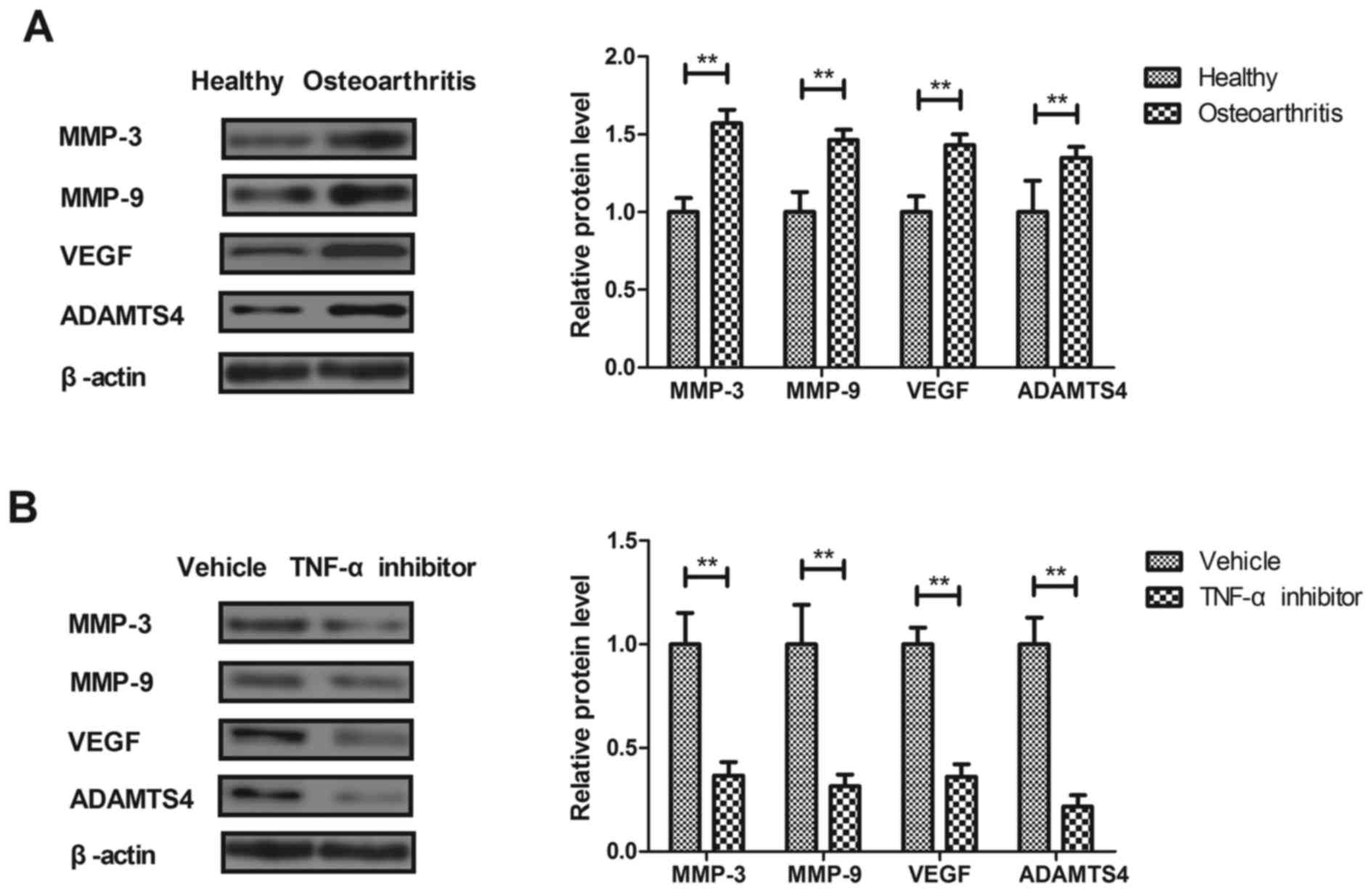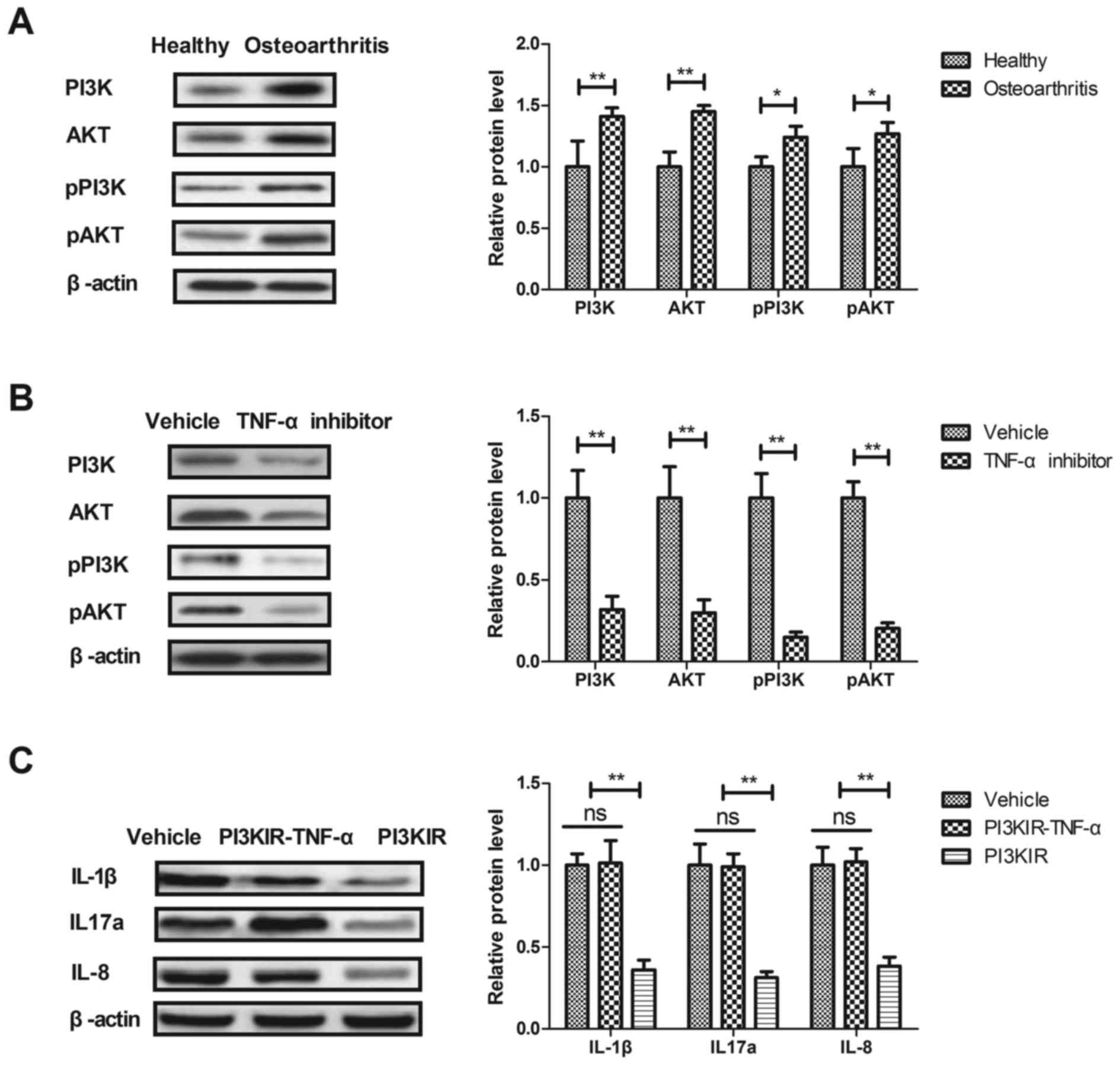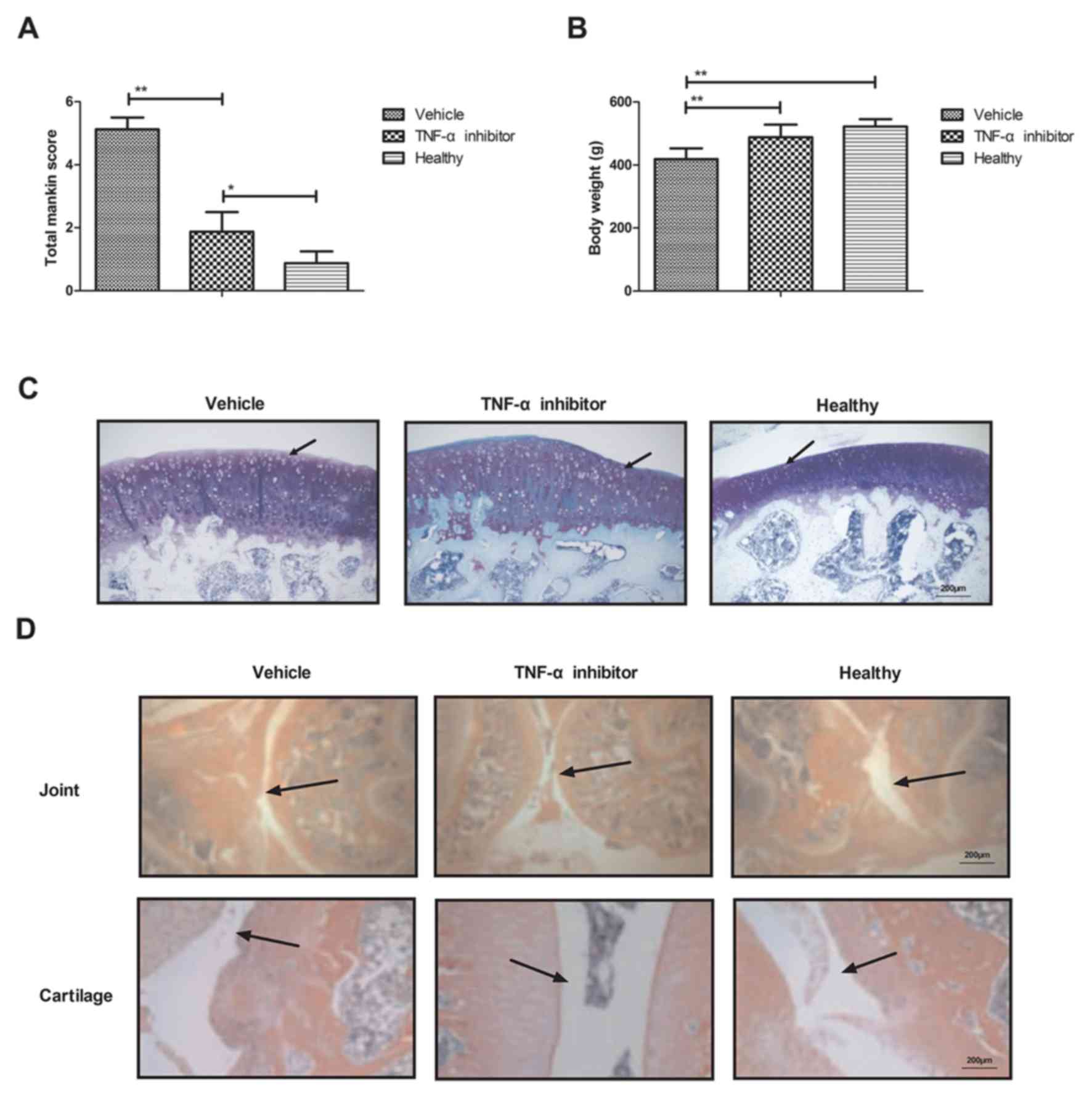|
1
|
Onishi K, Utturkar A, Chang E, Panush R,
Hata J and Perret-Karimi D: Osteoarthritis: A critical review. Crit
Rev Phys Rehabil Med. 24:251–264. 2012. View Article : Google Scholar : PubMed/NCBI
|
|
2
|
Veenhof C, Huisman PA, Barten JA, Takken T
and Pisters MF: Factors associated with physical activity in
patients with osteoarthritis of the hip or knee: A systematic
review. Osteoarthritis Cartilage. 20:6–12. 2012. View Article : Google Scholar : PubMed/NCBI
|
|
3
|
Davis AM: Osteoarthritis year in review:
Rehabilitation and outcomes. Osteoarthritis Cartilage. 20:201–206.
2012. View Article : Google Scholar : PubMed/NCBI
|
|
4
|
Kuijt MT, Inklaar H, Gouttebarge V and
Frings-Dresen MH: Knee and ankle osteoarthritis in former elite
soccer players: A systematic review of the recent literature. J Sci
Med Sport. 15:480–487. 2012. View Article : Google Scholar : PubMed/NCBI
|
|
5
|
Taylor R Jr, Raffa RB and Pergolizzi JV
Jr: Controlled release formulation of oxycodone in patients with
moderate to severe chronic osteoarthritis: A critical review of the
literature. J Pain Res. 5:77–87. 2012.PubMed/NCBI
|
|
6
|
Jotanovic Z, Mihelic R, Sestan B and
Dembic Z: Role of interleukin-1 inhibitors in osteoarthritis: An
evidence-based review. Drugs Aging. 29:343–358. 2012. View Article : Google Scholar : PubMed/NCBI
|
|
7
|
Lieberthal J, Sambamurthy N and Scanzello
CR: Inflammation in joint injury and post-traumatic osteoarthritis.
Osteoarthritis Cartilage. 23:1825–1834. 2015. View Article : Google Scholar : PubMed/NCBI
|
|
8
|
Hermann J, Lipp RW, Dunzinger A, Spreizer
C, Schaffler G, Kvaternik H, Ofner P and Graninger W: Anti-TNF
scintigraphy to assess TNF-α-associated joint inflammation in
rheumatoid arthritis and osteoarthritis. Clin Exp Rheumatol.
32:6142014.PubMed/NCBI
|
|
9
|
Gross JB, Guillaume C, Gégout-Pottie P,
Mainard D and Presle N: Synovial fluid levels of adipokines in
osteoarthritis: Association with local factors of inflammation and
cartilage maintenance. Biomed Mater Eng. 24 Suppl 1:S17–S25.
2014.
|
|
10
|
Ballegaard C, Riis RG, Bliddal H,
Christensen R, Henriksen M, Bartels EM, Lohmander LS, Hunter DJ,
Bouert R and Boesen M: Knee pain and inflammation in the
infrapatellar fat pad estimated by conventional and dynamic
contrast-enhanced magnetic resonance imaging in obese patients with
osteoarthritis: A cross-sectional study. Osteoarthritis Cartilage.
22:933–940. 2014. View Article : Google Scholar : PubMed/NCBI
|
|
11
|
Mancarella L, Addimanda O, Cavallari C and
Meliconi R: Synovial inflammation drives structural damage in hand
osteoarthritis: A narrative literature review. Curr Rheumatol Rev.
13:43–50. 2016. View Article : Google Scholar
|
|
12
|
Han L, Song JH, Yoon JH, Park YG, Lee SW,
Choi YJ, Nam SW, Lee JY and Park WS: TNF-α and TNF-β polymorphisms
are associated with susceptibility to osteoarthritis in a Korean
population. Korean J Pathol. 46:30–37. 2012. View Article : Google Scholar : PubMed/NCBI
|
|
13
|
Kaneko K, Sugitani M, Goto M and Murashima
A: Tocilizumab and pregnancy: Four cases of pregnancy in young
women with rheumatoid arthritis refractory to anti-TNF biologics
with exposure to tocilizumab. Modern rheumatology. 26:672–675.
2016. View Article : Google Scholar : PubMed/NCBI
|
|
14
|
Yuan PW, Liu DY, Chu XD, Hao YQ, Zhu C and
Qu Q: Effects of preventive administration of juanbi capsules on
TNF-alpha, IL-1 and IL-6 contents of joint fluid in the rabbit with
knee osteoarthritis. J Tradit Chin Med. 30:254–258. 2010.
View Article : Google Scholar : PubMed/NCBI
|
|
15
|
Stannus O, Jones G, Cicuttini F,
Parameswaran V, Quinn S, Burgess J and Ding C: Circulating levels
of IL-6 and TNF-α are associated with knee radiographic
osteoarthritis and knee cartilage loss in older adults.
Osteoarthritis Cartilage. 18:1441–1447. 2010. View Article : Google Scholar : PubMed/NCBI
|
|
16
|
Olson SA, Furman BD, Kraus VB, Huebner JL
and Guilak F: Reply to ‘Does progranulin account for the opposite
effects of etanercept and infliximab/adalimumab in osteoarthritis?’
by Wei et al. J Orthop Res. 34:15–16. 2016. View Article : Google Scholar : PubMed/NCBI
|
|
17
|
Martín G, Cañueto J, Santos-Briz A, Alonso
G, Unamuno PD and Cruz JJ: Interstitial granulomatous dermatitis
with arthritis associated with trastuzumab. J Eur Acad Dermatol
Venereol. 24:493–494. 2010. View Article : Google Scholar : PubMed/NCBI
|
|
18
|
Güler-Yüksel M, Allaart CF, Watt I,
Goekoop-Ruiterman YP, de Vries-Bouwstra JK, van Schaardenburg D,
van Krugten MV, Dijkmans BA, Huizinga TW, Lems WF and Kloppenburg
M: Treatment with TNF-α inhibitor infliximab might reduce hand
osteoarthritis in patients with rheumatoid arthritis.
Osteoarthritis Cartilage. 18:1256–1262. 2010. View Article : Google Scholar : PubMed/NCBI
|
|
19
|
Golledge HD: Response to Roustan et al.
Evaluating methods of mouse euthanasia on the oocyte quality:
Cervical dislocation versus isoflurane inhalation: Animal welfare
concerns regarding the aversiveness of isoflurane and its inability
to cause rapid death. Lab Anim. 46:358–359; author reply 360. 2012.
View Article : Google Scholar : PubMed/NCBI
|
|
20
|
Barve RA, Minnerly JC, Weiss DJ, Meyer DM,
Aguiar DJ, Sullivan PM, Weinrich SL and Head RD: Transcriptional
profiling and pathway analysis of monosodium iodoacetate-induced
experimental osteoarthritis in rats: Relevance to human disease.
Osteoarthritis Cartilage. 15:1190–1198. 2007. View Article : Google Scholar : PubMed/NCBI
|
|
21
|
Ali MS, Starke RM, Jabbour PM, Tjoumakaris
SI, Gonzalez LF, Rosenwasser RH, Owens GK, Koch WJ, Greig NH and
Dumont AS: TNF-α induces phenotypic modulation in cerebral vascular
smooth muscle cells: Implications for cerebral aneurysm pathology.
J Cereb Blood Flow Metab. 33:1564–1573. 2013. View Article : Google Scholar : PubMed/NCBI
|
|
22
|
Kurien BT and Scofield RH: Western
blotting. Methods. 38:283–293. 2006. View Article : Google Scholar : PubMed/NCBI
|
|
23
|
Bar-Yehuda S, Rath-Wolfson L, Del Valle L,
Ochaion A, Cohen S, Patoka R, Zozulya G, Barer F, Atar E,
Piña-Oviedo S, et al: Induction of an antiinflammatory effect and
prevention of cartilage damage in rat knee osteoarthritis by CF101
treatment. Arthritis Rheum. 60:3061–3071. 2009. View Article : Google Scholar : PubMed/NCBI
|
|
24
|
Wang C, Zeng L, Zhang T, Liu J and Wang W:
Tenuigenin prevents IL-1β-induced inflammation in human
osteoarthritis chondrocytes by suppressing PI3K/AKT/NF-κB signaling
pathway. Inflammation. 39:807–812. 2016. View Article : Google Scholar : PubMed/NCBI
|
|
25
|
Shen J, Abu-Amer Y, O'Keefe RJ and
McAlinden A: Inflammation and epigenetic regulation in
osteoarthritis. Connect Tissue Res. 58:49–63. 2017. View Article : Google Scholar : PubMed/NCBI
|
|
26
|
Ohtori S, Orita S, Yamauchi K, Eguchi Y,
Ochiai N, Kishida S, Kuniyoshi K, Aoki Y, Nakamura J, Ishikawa T,
et al: Efficacy of direct injection of etanercept into knee joints
for pain in moderate and severe knee osteoarthritis. Yonsei Med J.
56:1379–1383. 2015. View Article : Google Scholar : PubMed/NCBI
|
|
27
|
Yang X, Guan Y, Tian S, Wang Y, Sun K and
Chen Q: Mechanical and IL-1β responsive miR-365 contributes to
osteoarthritis development by targeting histone deacetylase 4. Int
J Mol Sci. 17:4362016. View Article : Google Scholar : PubMed/NCBI
|
|
28
|
Ma Z, Wang Y, Piao T and Liu J:
Echinocystic acid inhibits IL-1β-induced COX-2 and iNOS expression
in human osteoarthritis chondrocytes. Inflammation. 39:543–549.
2016. View Article : Google Scholar : PubMed/NCBI
|
|
29
|
Kunisch E, Kinne RW, Alsalameh RJ and
Alsalameh S: Pro-inflammatory IL-1beta and/or TNF-alpha up-regulate
matrix metalloproteases-1 and −3 mRNA in chondrocyte subpopulations
potentially pathogenic in osteoarthritis: In situ hybridization
studies on a single cell level. Int J Rheum Dis. 19:557–566. 2016.
View Article : Google Scholar : PubMed/NCBI
|
|
30
|
Yang Y, Gao SG, Zhang FJ, Luo W, Xue JX
and Lei GH: Effects of osteopontin on the expression of IL-6 and
IL-8 inflammatory factors in human knee osteoarthritis
chondrocytes. Eur Rev Med Pharmacol Sci. 18:3580–3586.
2014.PubMed/NCBI
|
|
31
|
van Baarsen LG, Lebre MC, van der Coelen
D, Aarrass S, Tang MW, Ramwadhdoebe TH, Gerlag DM and Tak PP:
Heterogeneous expression pattern of interleukin 17A (IL-17A),
IL-17F and their receptors in synovium of rheumatoid arthritis,
psoriatic arthritis and osteoarthritis: Possible explanation for
nonresponse to anti-IL-17 therapy? Arthritis Res Ther. 16:4262014.
View Article : Google Scholar : PubMed/NCBI
|
|
32
|
Chevalier X, Ravaud P, Maheu E, Baron G,
Rialland A, Vergnaud P, Roux C, Maugars Y, Mulleman D, Lukas C, et
al: Adalimumab in patients with hand osteoarthritis refractory to
analgesics and NSAIDs: A randomised, multicentre, double-blind,
placebo-controlled trial. Ann Rheum Dis. 74:1697–1705. 2015.
View Article : Google Scholar : PubMed/NCBI
|
|
33
|
Yuan Q, Sun L, Li JJ and An CH: Elevated
VEGF levels contribute to the pathogenesis of osteoarthritis. BMC
Musculoskelet Disord. 15:4372014. View Article : Google Scholar : PubMed/NCBI
|
|
34
|
Bondeson J, Wainwright S, Hughes C and
Caterson B: The regulation of the ADAMTS4 and ADAMTS5 aggrecanases
in osteoarthritis: A review. Clin Exp Rheumatol. 26:139–145.
2008.PubMed/NCBI
|
|
35
|
Chen J, Crawford R and Xiao Y: Vertical
inhibition of the PI3K/Akt/mTOR pathway for the treatment of
osteoarthritis. J Cell Biochem. 114:245–249. 2013. View Article : Google Scholar : PubMed/NCBI
|
|
36
|
Young SR, Gerard-O'Riley R, Harrington M
and Pavalko FM: Activation of NF-kappaB by fluid shear stress, but
not TNF-alpha, requires focal adhesion kinase in osteoblasts. Bone.
47:74–82. 2010. View Article : Google Scholar : PubMed/NCBI
|
|
37
|
Isozaki T, Kasama T, Takahashi R, Odai T,
Wakabayashi K, Kanemitsu H, Nohtomi K, Takeuchi HT, Matsukura S and
Tezuka M: Synergistic induction of CX3CL1 by TNF alpha and IFN
gamma in osteoblasts from rheumatoid arthritis: Involvement of
NF-kappa B and STAT-1 signaling pathways. J Inflamm Res. 1:19–28.
2008.PubMed/NCBI
|
|
38
|
Qiu L, Zhang L, Zhu L, Yang D, Li Z, Qin K
and Mi X: PI3K/Akt mediates expression of TNF-alpha mRNA and
activation of NF-kappaB in calyculin A-treated primary osteoblasts.
Oral Dis. 14:727–733. 2008. View Article : Google Scholar : PubMed/NCBI
|
|
39
|
Chen HW, Lin AH, Chu HC, Li CC, Tsai CW,
Chao CY, Wang CJ, Lii CK and Liu KL: Inhibition of TNF-α-induced
inflammation by andrographolide via down-regulation of the PI3K/Akt
signaling pathway. J Nat Prod. 74:2408–2413. 2011. View Article : Google Scholar : PubMed/NCBI
|
|
40
|
Inam A, Shahzad M, Shabbir A, Shahid H,
Shahid K and Javeed A: Carica papaya ameliorates allergic asthma
via down regulation of IL-4, IL-5, eotaxin, TNF-α, NF-κB, and iNOS
levels. Phytomedicine. 32:1–7. 2017. View Article : Google Scholar : PubMed/NCBI
|
|
41
|
Sanchavanakit N, Saengtong W,
Manokawinchoke J and Pavasant P: TNF-α stimulates MMP-3 production
via PGE2 signalling through the NF-κB and p38 MAPK pathway in a
murine cementoblast cell line. Arch Oral Biol. 60:1066–1074. 2015.
View Article : Google Scholar : PubMed/NCBI
|
|
42
|
Kim JM, Cho HH, Lee SY, Hong CP, Yang Jw,
Kim YS, Suh KT and Jung JS: Role of IRAK1 on TNF-induced
proliferation and NF-κB activation in human bone marrow mesenchymal
stem cells. Cell Physiol Biochem. 30:49–60. 2012. View Article : Google Scholar : PubMed/NCBI
|


















